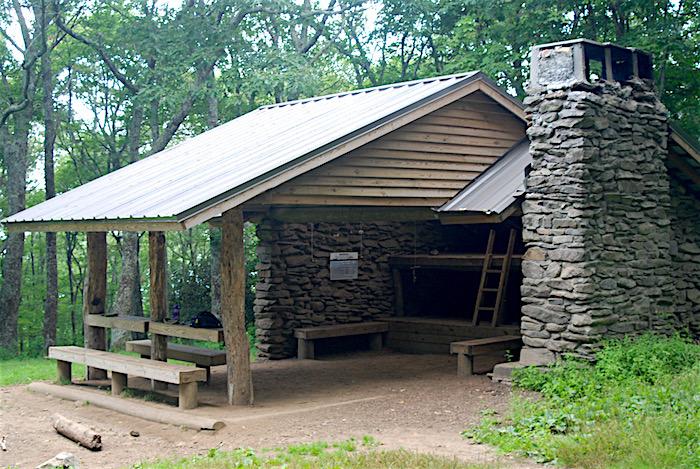
The Spence Field Backcountry Shelter in Great Smoky Mountains National Park has been temporarily closed due to a bear attack/Kurt Repanshek file photo
Editor's note: This updates to provide additional detail on the incident, provides recent history of bear-human incidents at the park, including the lone fatality due to a bear attack.
A thru-hiker on the Appalachian National Scenic Trail in Great Smoky Mountains National Park was bitten by a black bear while sleeping, sustaining unspecified leg injuries and prompting the Park Service to temporarily close the Spence Field Backcountry Shelter.
A park release said 49-year-old Bradley Veeder, of Las Vegas, Nevada, was bitten Tuesday night while sleeping in his tent near the shelter. Shortly after 11 p.m. Tuesday park staff was notified through Graham County 911 services that Veeder was bitten on his lower leg through his tent.
“It was dark, he yelled, and the bear ran away," Great Smoky spokeswoman Dana Soehn said during a phone call. “May and June historically are very difficult for bears in the Smokies due to the lack of abundant foods. Historically, this is when we see aggressive bear behavior, this time of year.”
The hiker did not have any food in his tent; he had hung his supplies from the bear cables provided at backcountry sites in the park, she said.
After the incident, all backcountry campers gathered in the shelter for the rest of the night. According to the release, "the bear did return later to the area where it tore through Veeder’s vacant tent, along with another vacant tent. The bear was not seen by any of the backpackers in the area."
"They (the hikers) did not hear the bear, they just discovered the tents had been torn when they got up the next morning," said Ms. Soehn.
On Wednesday afternoon Veeder was taken out of the backcountry on horseback and treated at Blount Memorial Hospital. Ms. Soehn had no specific details on the man's injuries other than they involved puncture wounds and bleeding, though she said "he was calm and alert through the entire incident." She did not know if he planned to continue his hike.
According to Ms. Soehn, over the past decade there have been nine human injuries related to bear incidents. Last June a 16-year-old backpacker was pulled out of his hammock by a bear, which was scared off by the teen's father. While park staff later killed a bear thought to be responsible, DNA tests indicated the wrong bear was killed.
Down through the park's history, just one visitor has been killed by a bear, according to the park spokeswoman. Killed in that attack, on May 21, 2000, was Glenda Bradley, 50, of Cosby, Tenn.
“She did not have any food with her, she was day-hiking. We didn’t have any reason to believe that that was a food habituated bear. By all indications, that bear was truly a wild bear," Ms. Soehn said.
Park wildlife staff Thursdy were stationed at Spence Field to monitor the area for bear activity.
Great Smoky officials urge everyone to exercise caution while hiking, camping, and picnicking to ensure their personal safety and to protect bears. Black bears in the park are wild and unpredictable. Though rare, attacks on humans do occur, causing injuries or death, the park release said.
For more information on what to do if you encounter a bear while hiking, please visit the park website at http://www.nps.gov/grsm/naturescience/black-bears.htm. To report a bear incident, please call 865-436-1230.



Comments
That's odd I thought camping in a tent at a shelter was not allowed??
When there are more people than the shelter can comfortably accommodate... I never sleep in the shelter myself.
Some sites accommodate both tents and shelter, especially in the more popular sections of the trail. Bear poles or cables are provided for both.
If the shelter is full or a non thru hikers with a reservation shows up the thru hiker can tent camp within sight of the shelter. Also, they are not strickly enforcing this rule right now because of the norovirus that is going around.
The article says he "did not have any food in his tent" (when he was attacked). Maybe so - but I'm willing to bet there had been food in or on the tent - or on his clothing - recently. Black bears generally don't attack unless they (or their cubs) feel threatened - or they think they've found something to eat. Since the hiker was asleep at the time - there's no way the bear thought he was a threat... the bear was looking for food, and chose that tent because it smelled like something it could eat.
If this person was a thruhiker tenting near the shelter would be fine.